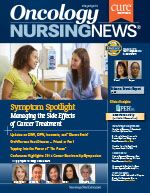Spirituality in Oncology Care: Patient Priorities and Innovative Interventions
The topic of spirituality has become increasingly relevant in oncology nursing dialogue, research, and practice, with an eye toward how best to assess and identify patients’ spiritual needs and then develop innovative clinical interventions to effectively address those needs.
Frances Payne Bolton School of Nursing at Case Western Reserve University

Darcia L. Simpson, MDiv, PhD

Darcia L. Simpson, MDiv, PhD
The topic of spirituality has become increasingly relevant in oncology nursing dialogue, research, and practice, with an eye toward how best to assess and identify patients’ spiritual needs and then develop innovative clinical interventions to effectively address those needs.
Research and dialogue around spiritual issues in clinical practice continues to grow, yet as Koenig rightly points out, “It is challenging to come up with a common definition for spirituality, especially one that fulfills the criteria necessary for research purposes."1 The latest literature related to oncology nursing and spirituality, for example, consistently acknowledges the vagueness that persists in understanding and defining the concept. Peteet and Balboni note that "spirituality remains difficult to precisely define and measure, but there is general agreement that it refers to a connection with a larger reality."2
In the clinical setting, the term spirituality is descriptive of a wide range of experiences, is less differentiated than religion, and typically refers to something positive. Therefore, thinking through spiritually in the context of oncology nursing should begin with research that gives attention to the identification of the patient’s spiritual needs.
Oncology Patient Spiritual Needs Attending to and caring for the spiritual needs of patients has always been part of nursing theory and practice; however, this spiritual focus was implicit and not explicitly addressed. Now, research suggests that patients want more involvement from nurses and physicians in relationship to their spiritual domains.
Along these lines, researchers tested the practicality and usefulness of a short (15 to 30—minute) clinical interview to assess the spiritual needs of 30 oncology patients, and they found that patients with cancer wanted their healthcare providers to be interested in their spiritual orientation.3 The study concluded that an interest in and an assessment of cancer patients' spirituality proved beneficial to patients, suggesting perhaps that the intervention of the assessment itself may result in improved patient satisfaction.
Similarly, Nixon and Narayanasamy confirmed the clear need for healthcare professionals to provide spiritual care—in this instance, exploring the spiritual needs of neuro-oncology patients from the patient perspective. They identified several spiritual needs or issues among the patients, including supportive family relationships, emotional support, loneliness, religious needs, need to talk, reassurance, anxiety, solitude, denial, plans for the future, thoughts about the meaning of life, end-of-life decisions, and discussion of beliefs.
Although several studies have identified and highlighted similar spiritual needs of patients, the literature is also replete with studies that concluded that not all oncology patients have spiritual needs. These claims are not surprising and further support the significance of assessment in thinking about spiritual care.
The Importance of Assessment
Embedded in thinking through spirituality is the notion of assessment. Spiritual assessment or spiritual history-taking is a broad concept used to describe the process by which patient spiritual needs are identified for the purpose of developing the care plan.
While assessment is not new to the nursing process, a literature review reveals some shifts in the approach to assessment. For instance, numerous original studies have explored the methods used to obtain spiritual histories. Of particular interest is the trend from early discussions of spiritual assessment using checklists of 5 to 7 items, to a narrative approach that can identify spiritual needs by listening to the cancer patient’s story.
Notably, these studies argued for replacing the more common practice of the nurse administering a brief spiritual screening or inventory, with a more in-depth exploration of the patients' spiritual history gleaned through listening to the patients' story. However, an important question emerged: How adequately prepared are oncology nurses to deal with deep spiritual issues that may surface during a narrative assessment?
A number of innovative clinical interventions have been tested to measure the effect of spiritual interventions on overall quality of life in oncology patients, including one by Piderman et al.5 This larger, multidisciplinary, supportive care intervention is aimed at improving all domains of quality of life and involved a series of support group meetings and discussions.
The spiritual component of the intervention focused on asking only two open-ended questions related to (1) life review, meaning and purpose, and (2) blessings and burdens. A key finding was how easily the open-ended prompts used in the spiritual intervention facilitated spiritual conversation on these topics with patients. This suggests that it is feasible to explore spiritual topics with patients with very brief invitations for discussion.
It is clear that many oncology professionals—nurses and physicians—may need additional training and support to develop comfort and self-confidence in raising the subject of spiritual wellbeing with patients. Recent evidence of both the importance of these discussions to patients and the relatively simple prompts needed to open the conversation, suggests this should be a priority among all health professionals. Having discussions with hospital clergy and obtaining continuing education in this area can be valuable steps in improving our ability to meet the spiritual needs of our patients.
Darcia Simpson is a member of the Oncology & Palliative Care Program at the Frances Payne Bolton School of Nursing at Case Western Reserve University in Cleveland, Ohio.
References
- Koenig HG. Spirituality and Health Research: Methods, Measurements, Statistics, and Resources. West Conshohocken, PA: Templeton Foundation Press; 2011:197.
- Peteet JR, Balboni MJ. Spirituality and religion in oncology. CA: Cancer J Clin. 2013;63(4):280-289.
- Frick E, Riedner C, Fegg MJ, Hauf S, Borasio GD. A clinical interview assessing cancer patients’ spiritual needs and preferences. Eur J Cancer Care. 2006;15(3):238-243.
- Nixon A, Narayanasamy A. The spiritual needs of neuro-oncology patients from patients’ perspective. J Clin Nurs. 2010;19(15):2259-2370.
- Piderman, KM, Johnson, ME, Frost, MH, et al. Spiritual quality of life in advanced cancer patients receiving radiation therapy. Psychooncology. 2014;23(2):216-221.





